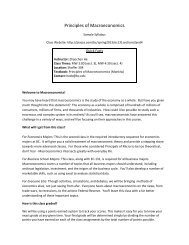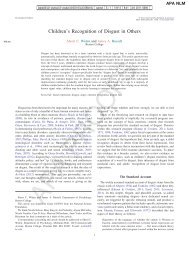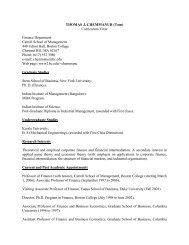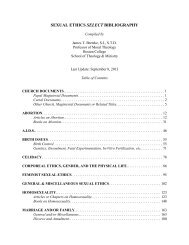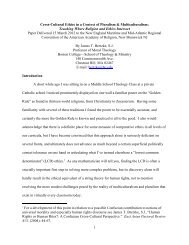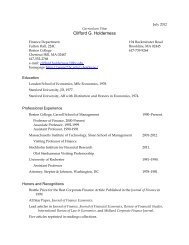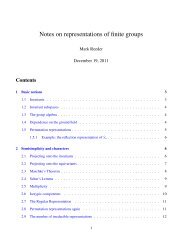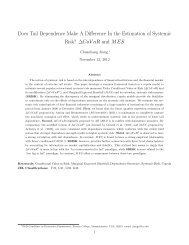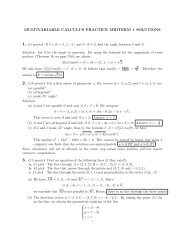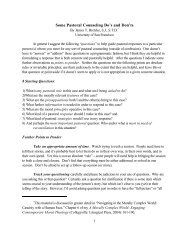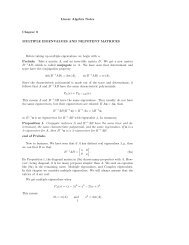Questions to the Moralist - Personal Web Server - Boston College
Questions to the Moralist - Personal Web Server - Boston College
Questions to the Moralist - Personal Web Server - Boston College
Create successful ePaper yourself
Turn your PDF publications into a flip-book with our unique Google optimized e-Paper software.
However, from o<strong>the</strong>r Church teachings in <strong>the</strong> general area of sexual ethics I suspect that<br />
<strong>the</strong> official position (if one were <strong>to</strong> appear) would be unfavorable <strong>to</strong> <strong>the</strong> idea of a<br />
transgender operation. People with both female and male genitalia do exist (<strong>the</strong>y're<br />
termed hermaphrodites), but this is a different reality than what is commonly called<br />
transgender. For definitions of sexuality (and we can intuit definitions of gender from<br />
<strong>the</strong>se) I would call your attention <strong>to</strong> <strong>the</strong> section of <strong>the</strong> Catechism of <strong>the</strong> Catholic Church<br />
which we e-mailed you some time back (dealing with <strong>the</strong> 6th commandment).<br />
Thanks,<br />
Fr. Jim<br />
As usual I’m stuck here at <strong>the</strong> multi-media browsing through your power point<br />
presentations on stem cell research, reproductive technologies, and bioethical<br />
issues. I just need your guidance on how does <strong>the</strong> church clearly describe <strong>the</strong> beginning<br />
of human life. I scanned through my copy of Donum Vitae last week but I didn't get<br />
much detail <strong>to</strong> quench my curiosity. The phrase "from <strong>the</strong> moment of conception" needs<br />
fur<strong>the</strong>r explanation <strong>to</strong> me.<br />
Fr. Bretzke replies<br />
Thanks for your question. To some extent I believe we’ve already addressed it, so let me<br />
just re-frame <strong>the</strong> issue. What does <strong>the</strong> term “from <strong>the</strong> moment of conception” mean from<br />
a scientific point of view? E.g., if we say that coitus ended at 8:15 PM on July 19, 2004<br />
when could we say that “conception” has occurred? What is it, and what is <strong>the</strong> time<br />
frame in which we are <strong>to</strong> “protect” or “safeguard” something? For example, from<br />
8:15:01 PM do we say that conception has occurred? If not, <strong>the</strong>n when? 8:30? 9:30?<br />
10:30?, etc. What would be <strong>the</strong> indica<strong>to</strong>rs <strong>to</strong> help us delineate “conception” that needs <strong>to</strong><br />
be treated as sacred? These would be good questions for <strong>the</strong> moral comps itself.<br />
Thanks,<br />
Fr. Jim<br />
A Follow-up Question<br />
<strong>to</strong> which case, no particular church document describes it clearly?! I mean that in detail<br />
somehow answers our many questions below...<br />
Fr. Bretzke replies<br />
That's correct, no Church document describes this clearly. The best <strong>the</strong>ological reflection<br />
I know of on this subject is an article by Richard McCormick entitled ""Who Or What Is<br />
<strong>the</strong> Pre-embryo" which is Ch. 14 in his book "Corrective Vision" (which <strong>the</strong> LST Library<br />
has). I would recommend reading that article. In terms of <strong>the</strong> competence of <strong>the</strong><br />
Magisterium <strong>to</strong> pronounce on matters of <strong>the</strong> natural law, could we say <strong>the</strong> necessary<br />
conditions for an infallible pronouncement could be present? If so, how? If not, why<br />
not?<br />
Fr. Jim<br />
22



